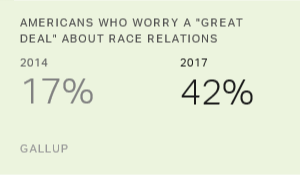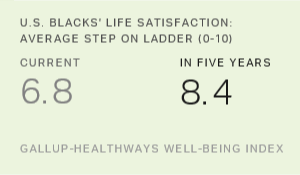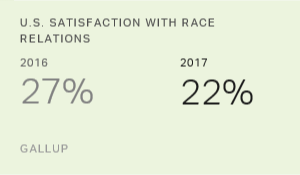What impact did the first African-American U.S. president, Barack Obama, have on racial attitudes in the U.S.? Did race relations improve, stay the same or get worse during his administration -- the last perhaps as a result of a "backlash" effect among racially resentful whites?
Our recent analysis of several indicators of racial resentment before and during the Obama administration provides evidence that racial resentment decreased among the majority of white Americans during Obama's presidency. Republicans were the only political group who did not decrease in racial resentment -- but they did not increase significantly either.
The challenge in addressing the issue of Obama's effect on racial attitudes is finding questions that have been asked consistently enough to provide a suitable measure before and during his years as president. Fortunately, Gallup has data from its ongoing and frequently updated Minority Rights and Relations poll that can help meet that need.
Our review found eight questions that were asked in 2004 and 2007 -- before Obama -- and then again in 2015 and 2016 -- during the Obama years. These questions, combined, provide what we believe is a reasonable measure of racial resentment. Analyzing responses from the two earlier surveys and comparing those with the responses from the two later surveys provides the needed divide between pre-Obama and Obama-era attitudes.
The questions are as follows:
- In general, do you think that blacks have as good a chance as whites in your community to get any kind of job for which they are qualified, or don't you think they have as good a chance?
- In general, do you think that black children have as good a chance as white children in your community to get a good education, or don't you think they have as good a chance?
- Again, in general, do you think that blacks have as good a chance as whites in your community to get any housing they can afford, or don't you think they have as good a chance?
- Just your impression, are blacks in your community treated less fairly than whites in the following situations?
- On the job/At work
- In neighborhood shops
- In stores downtown/In the shopping mall
- In restaurants/bars/theaters/other entertainment places
- In dealing with the police, such as traffic incidents
We looked only at respondents who identified their race as white. The racially resentful answer to each question is the one where the respondent does not believe blacks are treated unfairly and/or that they do have equal opportunities. The interpretation of these responses as racially resentful derives from other scholarly research in this area. Whites who say that blacks have as good a chance as whites to get jobs, schooling and housing, and who think blacks are treated just as fairly as whites across the list of five situations are racially unsympathetic. If racial resentment rose during the Obama years, the assumption is that whites would have become less sympathetic about blacks' situation in American society -- or, in other words, more racially resentful.
The analysis uses the mean of the eight items to construct a racial resentment scale that gives a score to each respondent. The top overall score of "1" means the person answered in the unsympathetic, resentful direction on all eight questions, and "0" means they answered all eight in the other direction.
As noted, we split the data into two groups. The first group contains data from 2004 and 2007. The second group contains data from 2015 and 2016.
Overall, white racial resentment decreased significantly from the years before Obama took office compared with the final two years of his administration. The index fell from .82 in 2004 and 2007 to .75 in 2015 and 2016, a statistically significant change.
| Racial Resentment Index* | |||||||||||||||||||||||||||||||||||||||||||||||||||||||||||||||||||||||||||||||||||||||||||||||||||
|---|---|---|---|---|---|---|---|---|---|---|---|---|---|---|---|---|---|---|---|---|---|---|---|---|---|---|---|---|---|---|---|---|---|---|---|---|---|---|---|---|---|---|---|---|---|---|---|---|---|---|---|---|---|---|---|---|---|---|---|---|---|---|---|---|---|---|---|---|---|---|---|---|---|---|---|---|---|---|---|---|---|---|---|---|---|---|---|---|---|---|---|---|---|---|---|---|---|---|---|
| Pre-Obama (2004, 2007) | .82 | ||||||||||||||||||||||||||||||||||||||||||||||||||||||||||||||||||||||||||||||||||||||||||||||||||
| During Obama presidency (2015, 2016) | .75 | ||||||||||||||||||||||||||||||||||||||||||||||||||||||||||||||||||||||||||||||||||||||||||||||||||
| *Based on an average across eight questions, where "1" is highest score and "0" is lowest | |||||||||||||||||||||||||||||||||||||||||||||||||||||||||||||||||||||||||||||||||||||||||||||||||||
| Gallup | |||||||||||||||||||||||||||||||||||||||||||||||||||||||||||||||||||||||||||||||||||||||||||||||||||
This same pattern -- the drop in the index between the two periods -- is evident among most subgroups. Racial resentment -- based on our measure -- decreased during the Obama years for both genders, across education levels, across all age groups, among those who are married and those who are not, among those working and not working, and in every geographic region.
The only political group whose members did not decrease in racial resentment between the two time periods are Republicans.
| Racial Resentment Index* | |||||||||||||||||||||||||||||||||||||||||||||||||||||||||||||||||||||||||||||||||||||||||||||||||||
|---|---|---|---|---|---|---|---|---|---|---|---|---|---|---|---|---|---|---|---|---|---|---|---|---|---|---|---|---|---|---|---|---|---|---|---|---|---|---|---|---|---|---|---|---|---|---|---|---|---|---|---|---|---|---|---|---|---|---|---|---|---|---|---|---|---|---|---|---|---|---|---|---|---|---|---|---|---|---|---|---|---|---|---|---|---|---|---|---|---|---|---|---|---|---|---|---|---|---|---|
| Republicans | Independents | Democrats | |||||||||||||||||||||||||||||||||||||||||||||||||||||||||||||||||||||||||||||||||||||||||||||||||
| Pre-Obama (2004, 2007) | .87 | .86 | .75 | ||||||||||||||||||||||||||||||||||||||||||||||||||||||||||||||||||||||||||||||||||||||||||||||||
| During Obama presidency (2015, 2016) | .87 | .77 | .62 | ||||||||||||||||||||||||||||||||||||||||||||||||||||||||||||||||||||||||||||||||||||||||||||||||
| *Based on an average across eight questions, where "1" is highest score and "0" is lowest | |||||||||||||||||||||||||||||||||||||||||||||||||||||||||||||||||||||||||||||||||||||||||||||||||||
| Gallup | |||||||||||||||||||||||||||||||||||||||||||||||||||||||||||||||||||||||||||||||||||||||||||||||||||
The differences between the two periods by party identification are statistically significant and important.
- Republicans are generally the most racially resentful; Democrats are the least.
- The decrease in racial resentment among Democrats is statistically significant.
- Independents also showed a decrease in racial resentment, and this decrease is marginally significant.
- Republicans did not show a statistically significant change.
All in all, our analyses suggest that based on the specific attitudinal indicators used in this analysis, racial resentment for the U.S. population as a whole diminished during the Obama years compared with the time before he took office. The racial resentment measure didn't become more positive among all groups, however. Republicans' attitudes didn't become worse but didn't improve either, while independents' and Democrats' attitudes did improve. This means that on a relative basis, the partisan gap on this measure of racial resentment expanded during the Obama years.
There are many ways to measure racial attitudes, and this analysis is limited to the data we have in hand and the particular dates for which we have data. These measures of recognition of, or failure to recognize, a situation in which blacks face discrimination, are an indirect measure of racial resentment, and there may be other measures of attitudes toward race that might find different trends.



